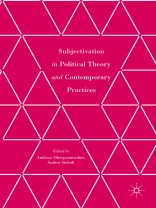This book explores, discusses, and assesses the actual and potential sense of subjectivation in a variety of contexts. In particular, it reflects the genealogies, connections, variations, and practical implications of various theories of subjectivity and subjection while providing an up-to-date and authoritative account of how to engage with the ‘subject’. Rather than addressing the ‘subject’ merely in theoretical terms, this book explores subjectivation as a seminal expression of subjective practices in the plural. To the extent that subjectivity and subjection are key terms in a plurality of discourses and for a number of disciplines, Subjectivation in Political Theory and Contemporary Practices advances a trans-disciplinary reading by taking into account relevant debates that stretch from poststructuralism via postfordism to postdemocracy. In this sense, the book introduces readers to current approaches to subjectivation by displacing conventional understandings and suggesting unexpected reformulations.
表中的内容
1. 0. Introducing a Contorted Subject Called ‘Subjectivation’. Andreas Oberprantacher & Andrei Siclodi.- 2. Section 1: Re-Tracing Subjectivation.- 3. 1. After the Subject is Before the Subject: On the Political Meaning of Subjectivation in Nancy and Lacoue-Labarthe. Artur R. Boelderl.- 4. 2. The Excruciating Work of Love …On Foucault’s Kehre towards the Subject. Andrea Mubi Brighenti.- 5. 3. On Theories of Subjectivity and the Practices of Political Subjectivation: Responsiveness, Dissent, and the Precarious Livability of Human Life. Burkhard Liebsch.- 6. 4. Political Subjectivation and Metaphysical Movement. Sandra Lehmann.- 7. Section 2: Subjectivation in a Variety of Contemporary Practices.- 8. 5. Outraging Speech: On the Politics of Performative Contradictions. Gerhard Posselt.- 9. 6. Practices of Life and the Religious Character of Capitalism: An Analysis Through Weber, Benjamin, and Foucault. Elettra Stimilli.- 10. 7. Presentist Democracy: The Now-Time of Struggles. Isabell Lorey.- 11. 8. Transitory Erasures: Subjects of Institutional Critique. Vlad Morariu.- 12. Section 3: At the Limits of Subjectivation.- 13. 9. Breaking Out of the Cycle of Fear: Exodus Politics. Andreas Hetzel.- 14. 10. Humor, Revolt, and Subjectivity. Serhat Karakayali and Özge Yaka.- 15. 11. Metropolitan Stasis@Real Democracy@Post-Representative Hegemony: On the Sociology of ‘Social Non-Movements’ and Assemblies. Vassilis S. Tsianos.- 16. 12. From Mute Objects to Militant Subjects: The Politics of Rebellious Animals. Aylon A. Cohen.- 17. s and Alexandra Délano.- 20. 15. Radical Democratic Disobedience: ‘Illegals’ as a Litigious Political Subject. Andreas Oberprantacher.- 21. 16. Subjectivating the ‘Other’? Critical Art Practices, Migration Politics, and the Public Sphere in Europe.- Andrei Siclodi.- Index.
关于作者
Andreas Oberprantacher is Associate Professor at the Department of Philosophy, University of Innsbruck, Austria; founding member of the research centre Migration & Globalization, and faculty member of the UNESCO Chair for Peace Studies. His previous publications include ‘Of Other Spaces (of Memory)’, Social Research: An International Quarterly (2016), ‘Holey Union: Contested European Frontier Zones’, Journal of Conflictology (2014), and Power and Justice in International Relations: Interdisciplinary Approaches to Global Challenges (co-ed with Marie-Luisa Frick) (2009).
Andrei Siclodi is a curator, writer, editor, and cultural worker based in Innsbruck, Austria. He is founding director of the International Fellowship Program for Art and Theory at Künstlerhaus Büchsenhausen in Innsbruck, and editor of the publication series ‘Büchs’n’Books—Art and Knowledge Production in Context’. His previous publications include Private Investigations—Paths to Critical Knowledge Production in Contemporary Art (ed) (2011) and ‘Out of the Commodity!’ (guest ed), Open Systems Online Journal (2013).












